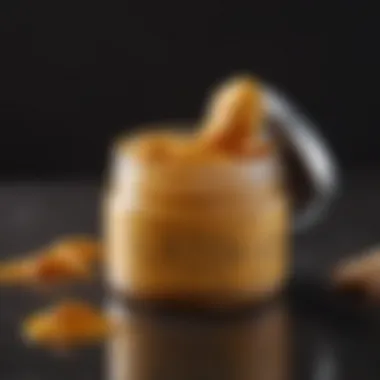Unlocking the Skincare Advantages of Turmeric Paste for Acne Treatment


Beauty Tips and Tricks
Turmeric paste is a secret weapon in the realm of skincare, revered for its potent anti-inflammatory properties and its ability to combat acne effectively. Incorporating turmeric paste into your daily skincare routine can work wonders for your skin, providing a natural and holistic approach to skincare. This humble paste derived from the turmeric root is a powerhouse of benefits, making it a must-have for anyone looking to achieve healthier, acne-free skin.
Skincare Routine Tips
When it comes to integrating turmeric paste into your skincare routine, consistency is key. A simple yet effective way to harness its benefits is by using it as a spot treatment for acne-prone areas. Additionally, incorporating turmeric paste into DIY face masks can help in reducing inflammation and targeting stubborn acne. Remember to perform a patch test before applying the paste to your entire face to avoid any adverse reactions.
Product Reviews
While there are numerous turmeric-based skincare products available in the market, creating your own turmeric paste at home gives you control over the ingredients used. DIY turmeric paste recipes are easy to make and customizable to suit your skin's needs. By opting for natural, homemade turmeric paste, you ensure that your skin receives the purest form of this potent ingredient, free from harmful additives and chemicals.
Skincare Product Reviews
In the realm of skincare products, turmeric paste stands out for its efficacy in combating acne and promoting skin health. Many users have reported significant improvements in their skin's condition after incorporating turmeric paste into their skincare routine. Its anti-inflammatory properties make it a valuable addition to any skincare regimen, particularly for those struggling with acne-prone skin.
Expert Beauty Advice
For expert insights on incorporating turmeric paste into your skincare routine, consult with skincare specialists or dermatologists. They can provide personalized recommendations based on your skin type and concerns, ensuring optimal results. By seeking professional advice, you can maximize the benefits of turmeric paste and address any skin issues effectively.
Skincare Specialist Recommendations
Skincare specialists often recommend turmeric paste for acne-prone skin due to its proven anti-inflammatory and antibacterial properties. They may suggest specific ways to incorporate turmeric paste into your skincare regimen based on your unique skin concerns. Their expertise can help you leverage the full potential of turmeric paste for clearer, healthier skin.
Introduction
In the realm of skincare, the quest for effective acne treatments is a never-ending journey for many. Acne, a common skin condition with various underlying causes, can have a significant impact on one's skin health and overall confidence. In this comprehensive guide, we delve deep into the promising realm of using turmeric paste as a natural remedy for acne. Turmeric, a vibrant yellow spice known for its culinary uses, boasts potent anti-inflammatory, antibacterial, and antioxidant properties that make it a valuable asset in skincare. By harnessing the power of turmeric paste, individuals can potentially reduce inflammation, combat acne-causing bacteria, and aid in the healing process of acne-related skin damage.
Understanding the intricacies of acne formation is crucial in grasping the significance of incorporating turmeric paste into one's skincare routine. Acne often arises from factors such as excess sebum production, leading to clogged pores that become breeding grounds for bacterial infections. The repercussions of acne on skin health go beyond just surface blemishes, as inflammation, scarring, and hyperpigmentation can leave lasting effects if not addressed properly. Turmeric paste, with its multifaceted properties, holds the promise of not only addressing these root causes of acne but also potentially alleviating the secondary effects that impact skin health.
As we progress through this exploration of turmeric paste for acne treatment, it becomes evident that this natural remedy offers a holistic approach to skincare. The upcoming sections will delve deeper into the specific benefits of turmeric for the skin, methods for preparing and applying turmeric paste, potential side effects to be mindful of, and strategies for seamlessly integrating turmeric paste into a regular skincare regimen. By synthesizing scientific insights with practical application, this guide aims to equip readers with the knowledge and tools necessary to leverage turmeric paste effectively in their battle against acne and in nurturing healthier, more radiant skin.
Understanding Acne
Acne, a common skin condition affecting many individuals, plays a significant role in skincare discussions. Understanding the root causes of acne is crucial for developing effective treatment approaches. It involves delving into the complexities of excess sebum production, clogged pores, and bacterial infections that contribute to acne breakouts. By comprehending these factors, individuals can identify suitable remedies and skincare routines tailored to combat acne effectively.


Causes of Acne
Excess Sebum Production
Excess sebum production, the overactivity of sebaceous glands in producing oil, is a key factor in acne development. This overproduction can lead to oily skin, clogged pores, and acne flare-ups. While sebum is essential for skin lubrication, an excessive amount can contribute to acne formation. Understanding how to regulate sebum production through skincare practices is pivotal in managing acne and promoting healthier skin.
Clogged Pores
Clogged pores result from a combination of sebum, dead skin cells, and bacteria blocking the hair follicles. This blockage creates an ideal environment for acne-causing bacteria to thrive, leading to inflammation and blemishes. Proper cleansing and exfoliation techniques are essential in preventing pore blockages and reducing the risk of acne breakouts. By addressing clogged pores, individuals can maintain clear and radiant skin devoid of acne concerns.
Bacterial Infections
Bacterial infections, particularly by Propionibacterium acnes, play a critical role in aggravating acne symptoms. These bacteria thrive in the hair follicles, causing inflammation, redness, and pus-filled lesions characteristic of acne. Understanding bacterial infection dynamics allows for the implementation of targeted treatments like antibacterial agents or topical solutions to combat acne-causing bacteria effectively. By addressing bacterial infections, individuals can accelerate the healing process and prevent acne recurrence.
Impact of Acne on Skin Health
Inflammation
Inflammation is a common outcome of acne breakouts, characterized by redness, swelling, and discomfort. The inflammatory response triggered by acne can exacerbate skin conditions, leading to increased skin sensitivity and irritation. Addressing inflammation through anti-inflammatory agents, gentle skincare practices, and adequate hydration can reduce acne-related redness and promote overall skin health.
Scarring
Scarring is a lingering consequence of severe acne, often manifesting as dark spots or pitted marks on the skin. Acne scarring can impact one's self-esteem and skin appearance, highlighting the importance of preventive measures and prompt treatment. Exploring scar-reducing techniques, such as laser treatments or chemical peels, can help minimize the appearance of acne scars and restore skin texture and tone.
Hyperpigmentation
Hyperpigmentation, the darkening of skin areas affected by acne, is a common concern for individuals with darker skin tones. Post-inflammatory hyperpigmentation can persist long after acne lesions have healed, affecting skin uniformity and tone. Implementing brightening agents, like vitamin C serums or exfoliating treatments, can help fade hyperpigmentation and promote more radiant and even-toned skin.
Turmeric Paste: An Overview
Turmeric paste holds a key position in the discourse surrounding acne treatment due to its remarkable properties. The deep-rooted significance of turmeric in traditional medicine is now gaining recognition worldwide for its therapeutic benefits. Within this article, the focus remains on elucidating the various facets of turmeric paste and its role in combating acne, addressing the findings with precision and detail. By delving into the properties and benefits of turmeric, a holistic understanding of its efficacy for skincare emerges.
Properties of Turmeric
Anti-Inflammatory
Turmeric's anti-inflammatory attribute stands out prominently, making it a valuable asset in the realm of skincare. This specific characteristic is pivotal in reducing redness and swelling associated with acne, promoting a calmer complexion. The distinct feature of being anti-inflammatory underscores turmeric's suitability for soothing irritated skin and battling inflammatory skin conditions. Despite its potency in curbing inflammation, careful consideration is needed to avoid any adverse effects due to individual skin sensitivity.


Antibacterial
In the context of acne treatment, turmeric's antibacterial property plays a critical role in inhibiting the growth of acne-causing bacteria. This key characteristic amplifies turmeric's effectiveness in targeting the root cause of breakouts, thereby promoting clearer skin. The unique feature of being antibacterial positions turmeric paste as a proactive solution against bacterial infections on the skin, emphasizing its significance in acne management. However, caution is advised to prevent any potential disruptions to the skin's natural microbiome.
Antioxidant
Turmeric's antioxidant quality contributes substantially to its skincare benefits, offering protection against free radicals and oxidative stress. The key characteristic of being an antioxidant aligns with preventing premature skin aging and maintaining skin health. The unique feature of antioxidant properties in turmeric enhances its overall value in promoting radiant and youthful skin, accentuating the importance of incorporating turmeric paste into regular skincare routines.
Benefits of Turmeric for Skin
Reduces Inflammation
The ability of turmeric to reduce inflammation is a pivotal benefit for skin health, particularly in addressing conditions like acne. Its remarkable anti-inflammatory properties work to soothe inflamed skin, diminishing redness and discomfort. The key characteristic of inflammation reduction in turmeric underscores its role in calming skin irritations and improving overall skin texture, advocating for its integration into skincare regimes. Despite the advantages, prudent use is essential to avoid any potential reactions on sensitive skin types.
Fights Acne-Causing Bacteria
Turmeric's efficacy in combating acne-causing bacteria is a significant boon for individuals struggling with persistent breakouts. This specific aspect highlights turmeric's role in eradicating harmful bacteria that contribute to skin imperfections, fostering a clearer and healthier complexion. The unique feature of actively targeting acne-causing bacteria positions turmeric paste as a potent ally in the fight against acne, emphasizing its importance in maintaining blemish-free skin. However, tailored application methods are recommended to maximize the antibacterial benefits while minimizing skin reactions.
Using Turmeric Paste for Acne Treatment
In this section, we delve into the significant benefits and considerations of using turmeric paste for acne treatment. Turmeric's efficacy in skincare is well-documented, primarily due to its anti-inflammatory, antibacterial, and antioxidant properties. These components are crucial in addressing acne concerns effectively. The anti-inflammatory nature of turmeric helps in reducing redness and swelling associated with acne breakouts, while its antibacterial properties combat the acne-causing bacteria, promoting clearer skin. Additionally, the antioxidant effects aid in healing damaged skin and promoting overall skin health.
Preparation of Turmeric Paste
Ingredients Needed
When preparing turmeric paste for acne treatment, key ingredients include turmeric powder, natural yogurt, and honey. Turmeric powder, known for its potent anti-inflammatory properties, is the star ingredient that helps in calming inflammation and reducing acne flare-ups. Natural yogurt acts as a soothing agent, promoting gentle exfoliation and moisturization, ideal for acne-prone skin. Honey, with its antibacterial properties, complements turmeric's benefits by fighting bacteria that contribute to acne formation, making it a popular choice for natural skincare routines.
Step-by-Step Guide
The step-by-step process of making turmeric paste involves simple yet essential steps. Start by combining turmeric powder, natural yogurt, and honey in a clean bowl. Mix the ingredients thoroughly until a smooth paste is formed. Apply the turmeric paste evenly on the affected areas of the skin or as a face mask. Leave it on for about 15-20 minutes to allow the ingredients to work their magic. Rinse off with lukewarm water and pat the skin dry. This guide ensures the effective application of turmeric paste for optimal results in acne treatment.
Application Techniques
Spot Treatment
For spot treatment, apply a small amount of turmeric paste directly onto individual acne spots. The paste's anti-inflammatory and antibacterial properties target the acne breakout, helping to reduce inflammation and prevent further bacterial growth. This targeted approach is effective in accelerating the healing process of specific acne blemishes.


Face Mask
As a face mask, turmeric paste offers benefits for overall skin health. The paste can be applied generously to the entire face, providing a comprehensive treatment for acne-prone skin. The mask works to calm inflammation, fight acne-causing bacteria, and promote healing, resulting in clearer and healthier skin.
Potential Side Effects
Skin Sensitivity
One potential side effect of using turmeric paste for acne treatment is skin sensitivity. Some individuals may experience mild redness or tingling sensations upon application. It is advisable to perform a patch test before using the paste extensively to gauge skin sensitivity and avoid adverse reactions.
Staining
Another consideration is the potential for staining. Turmeric has a vibrant yellow pigment that can temporarily stain the skin. To prevent staining, ensure thorough rinsing with water after application. Despite this risk, the benefits of turmeric paste in acne treatment far outweigh the minor inconvenience of temporary staining.
Incorporating Turmeric Paste into Skincare Routine
Skincare enthusiasts are increasingly turning to natural remedies like turmeric paste for managing acne due to its renowned anti-inflammatory and antibacterial properties. The incorporation of turmeric paste into a regular skincare routine can significantly benefit those struggling with acne-related skin concerns. By diligently including this potent paste in your skincare regimen, you can potentially experience a reduction in inflammation, improved healing of acne lesions, and overall healthier skin.
Frequency of Use
Daily Application
Incorporating turmeric paste into your daily skincare routine can be beneficial for individuals dealing with persistent acne issues. The key characteristic of daily application lies in its consistency, as the regular use of turmeric paste can help maintain its efficacy in combating inflammation and acne-causing bacteria. While the unique feature of daily application may require commitment and patience, the advantages of this routine include a more sustained impact on reducing acne severity and promoting skin healing.
Weekly Treatments
On the other hand, opting for weekly treatments involving turmeric paste can be a strategic approach for individuals with less severe acne concerns. The key characteristic of weekly treatments is their supplementary nature, providing an extra boost to the skin's healing process without overwhelming daily skincare routines. The unique feature of weekly treatments allows for a concentrated application of turmeric paste, which may offer targeted benefits. While weekly treatments may require a bit more planning and patience, their advantage lies in providing intensive care at specific intervals to improve overall skin health.
Combination with Other Skincare Products
Serums
Adding turmeric paste to your serums can enhance the efficacy of your skincare routine due to its anti-inflammatory and antioxidant properties. The key characteristic of serums infused with turmeric is their ability to deliver a concentrated dose of the active ingredient, targeting specific skin concerns effectively. The unique feature of including turmeric in serums is the potential synergistic effects when combined with other beneficial ingredients, offering a comprehensive approach to treating acne and promoting skin health.
Moisturizers
Incorporating turmeric paste into moisturizers can provide a nourishing and soothing addition to your skincare routine. The key characteristic of turmeric-infused moisturizers is their hydrating properties, which can help balance the skin while delivering the benefits of turmeric. The unique feature of using turmeric in moisturizers is its ability to address acne-related concerns while maintaining skin hydration. While there may be considerations for those with sensitive skin, the advantages of using turmeric in moisturizers include a holistic approach to skincare that caters to both acne treatment and overall skin nourishment.
Conclusion
Moreover, the antioxidant nature of turmeric contributes to overall skin health by protecting against free radical damage and promoting a youthful appearance. Regular use of turmeric paste can help in detoxifying the skin and promoting a radiant glow. Furthermore, turmeric's ability to promote healing can be beneficial in reducing acne scars and hyperpigmentation, resulting in improved skin tone and texture.
When considering the importance of incorporating turmeric paste into a skincare routine, it is crucial to note the natural and gentle nature of this remedy. Unlike harsh chemical treatments, turmeric paste offers a holistic approach to acne treatment without causing irritation or adverse side effects for most individuals. This natural alternative provides a safe and effective solution for those seeking to address acne concerns without compromising skin health.







